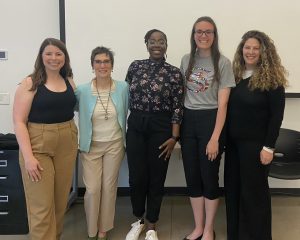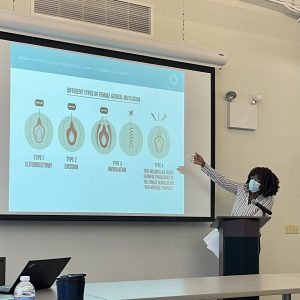AHA Empowers Students, Teachers, and Parents to Protect Children from FGM/C in Chicago’s North Side

Dami Alabi, our Chicago North Side Program Coordinator, conducting a training
November 18, 2025
What if every student in Chicago knew her rights, and every adult knew how to protect them? That is the vision driving our work. With the launch of WE END FGM/C Chicago’s North Side early this year, a new DOJ‑funded initiative, AHA Foundation is working to ensure that every teacher, counselor, and youth‑serving professional has the tools to recognize risk, respond with compassion, and protect girls from female genital mutilation/cutting (FGM/C) before the harm occurs. At the same time, we are helping educate students and parents on this topic.
We are now completing the first year of this three‑year program. Year one focused on planning—finalizing a K-12 prevention curriculum and forging new partnerships. With that foundation in place, we are ready to step into year two: implementation. To share what this milestone means on the ground, we spoke with Dami, our program coordinator, about the accomplishments so far and the vision for what’s ahead.
Why are schools such a critical place to focus prevention efforts?
Dami: Most girls who experience FGM/C are cut between birth and age 15—the very years they spend in school. Schools bring together trust, information, and the opportunity for early intervention. When teachers know what to look for and when students understand their rights, prevention becomes possible.
What accomplishments from the first year of this program make you most proud?
Dami: It’s difficult to choose among so many milestones from this first year. But if I had to highlight one, I’m most proud of the prevention curriculum we created for K-12 schools. It’s flexible and age‑responsive, designed so teachers can use it in advisory periods, health classes, or district sex education programs.
Sharing it now with school partners for feedback feels like a turning point—because it means that education experts are helping shape the tool that will protect girls in the years ahead. Their input ensures this curriculum won’t just sit on paper but will become a living resource in classrooms. That’s what makes me proud: knowing year two will move us from preparation to real prevention.

AHA Foundation staff, alongside partners from Forma, Tapestry 360 Health, and RTI, delivered FGM-prevention training to professionals at Resilience—one of Chicago’s leading organizations supporting survivors of domestic violence.
New and expanded partnerships were a big part of year one. Can you talk about why they matter?
Dami: Absolutely. We know AHA can’t do this alone. That’s why we’re expanding our school partnerships through a national network that shows up for students by connecting them to the critical support and resources they need to succeed in the classroom and beyond.
And partnerships aren’t limited to schools. For example, one of our new partners, a multi‑agency center that supports survivors of domestic violence, sexual violence, and human trafficking, is working to include our FGM/C screening in its intake procedures. That’s huge. Once formalized, this means survivors who might never have been asked about this before will now be identified and supported.
You’ve also been working with healthcare and education leaders. What does that add?
Dami: We have been lucky to connect with a hospital health education program that has a trusted presence in Chicago schools. We conducted the FGM training with their staff already. They also invited us to observe their sex education classes so we could explore how to integrate our FGM/C content into their existing sex education curriculum. That’s how we scale—by building on what’s already working.
And a leading child protection nonprofit in Chicago asked to review our curriculum for possible integration into their gender‑based violence and theater programming. That tells me this issue is resonating across sectors.
And what about survivor support?
Dami: We’ve started working with a legal services organization. FGM survivors often come to them for legal help, but what survivors need is holistic care—legal, emotional, and practical support. We shared our resources and will train their staff so they can better serve survivors, including potentially students and their families.
We’re also exploring survivor support groups that bridge legal assistance with holistic care. Survivors shouldn’t have to choose between justice and care. They deserve both.
Looking ahead, what excites you most about the implementation phase that is soon to begin?
Dami: It’s seeing all this groundwork come alive. Just recently, I gave a presentation at a local high school on FGM/C. A student reached out after the topic came up in her global policy class—she had researched who was doing FGM/C work, found us, and asked that we present to her class. For this presentation, we were able to utilize the curriculum we had created for the training, and seeing it resonate with students in real time was powerful.
When students learn about this harmful practice and begin asking thoughtful questions, or when a parent chooses protection over tradition—that’s where prevention begins. Implementation means those moments will be met with empathy, understanding, and action. That’s what keeps me going.


